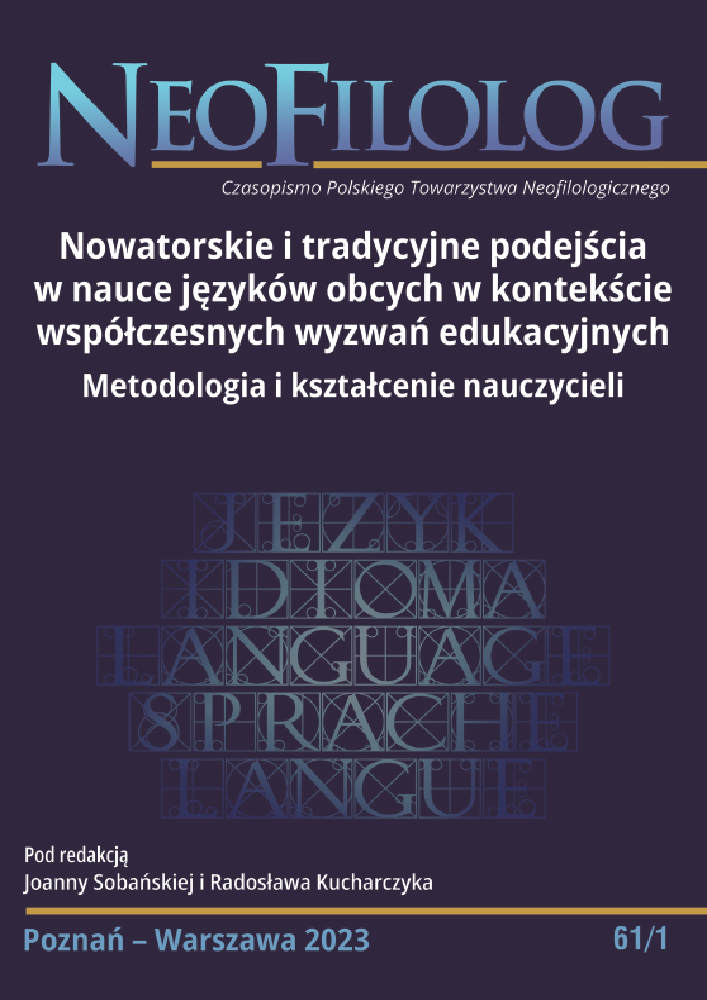Abstrakt
In the knowledge economy, the memorization of facts and procedures is important but not sufficient. In order to responding to changes in society and the economy it becomes necessary to develop key competences. Competences-oriented education introduces innovative forms of teaching and learning based on the constructivist learning approach, such as the LbT-Method (Learning by Teaching /Lernen durch Lehren/), which gives the students the opportunity to learn by doing.
The article introduces the results of a survey which was conducted during the third semester of a “Grammar in Communication” course at the faculty of Applied Linguistics at Maria Curie-Skłodowska University in Lublin. According to the students’ assessment, their participation in this course enhanced their literacy, multilingual, personal, social and learning-to-learn competences, as well as their entrepreneurial competence. The results of this survey will be used to optimize the course design in the future.
Bibliografia
Atteslander R. (2003), Methoden der empirischen Sozialforschung. Berlin, New York: Walter de Gruyter.
Beyer K., Krüssel H. (2004), Die Bedeutung der Konstruktivistischen Didaktik, (in:) Beyer K. (Hrsg.), Planungshilfen für den Fachunterricht. Die Praxisbedeutung der wichtigsten allgemein-didaktischen Konzeptionen. Stuttgart: Schneider Verlag Hohengehren GmbH, S. 122–145.
Empfehlung des Rates der Europäischen Union vom 22. Mai 2018 zu Schlüsselkompetenzen für lebenslanges Lernen. Online: https://eur-lex.europa.eu/legal-content/DE/TXT/HTML/?uri=CELEX:32018H0604(01) [abgerufen am 15.06.2023].
European Commission, Directorate-General for Education, Youth, Sport and Culture (2019), Key competences for lifelong learning. Publications Office. Online: https://data.europa.eu/doi/10.2766/569540 [abgerufen am 13.06.2023].
Gold A. (2015), Guter Unterricht. Was wir wirklich darüber wissen. Göttingen: Vandenhoeck & Ruprecht. DOI: https://doi.org/10.13109/9783666701726
Hattie J. (2015), Widoczne uczenie się dla nauczycieli. Jak maksymalizować siłę oddziaływania na uczenie się. Warszawa: Centrum Edukacji Obywatelskiej.
Janicka M. (2019), Effizienz der Methode Lernen durch Lehren (LdL) – Ergebnisse eines Experiments. „Glottodidactica“, Nr. XLVI/1, S. 9–21. DOI: https://doi.org/10.14746/gl.2019.46.1.01
Kelchner R., Martin J.-P. (1998), Lernen durch Lehren, (in:) Timm J.-P. (Hrsg.), Englisch lernen und lehren – Didaktik des Englischunterrichts. Berlin: Cornelsen.
Martin J.-P. (1986), Für eine Übernahme von Lehrfunktionen durch Schüler. „Praxis des neusprachlichen Unterrichts“, Nr. 4/86, S. 395–403. Online: http://www.ldl.de/Material/Publikationen/lehrfunk.pdf [abgerufen am 30.11.2022].
Opis metody LdL, https://www.ore.edu.pl/2011/04/metoda-ldl-69277954/ [abgerufen am 15.06.2023].
Reich K. (2004), Konstruktivistische Didaktik. Lehren und Lernen aus interaktionistischer Sicht. München/ Unterschleißheim: Luchterhand.
Siebert H. (2005), Pädagogischer Konstruktivismus. Lernzentrierte Pädagogik in Schule und Erwachsenenbildung. Weinheim und Basel: Beltz Verlag.
Licencja
Prawa autorskie (c) 2023 Monika Janicka

Utwór dostępny jest na licencji Creative Commons Uznanie autorstwa – Bez utworów zależnych 4.0 Międzynarodowe.
Przedstawiany utwór (artykuł) upubliczniany jest na podstawie umowy z autorem i na licencji Creative Commons Attribution-NoDerivatives 4.0 International (CC BY-ND 4.0).
Użytkownicy mają obowiązek podania wraz z rozpowszechnionym utworem, informacji o autorstwie, tytule, źródle (odnośniki do oryginalnego utworu, DOI) oraz samej licencji;
- bez tworzenia utworów zależnych,
- utwór musi być zachowany w oryginalnej postaci.
Uniwersytet im. Adama Mickiewicza w Poznaniu zachowuje prawo do czasopisma jako całości (układ, forma graficzna, tytuł, projekt okładki, logo itp.).

